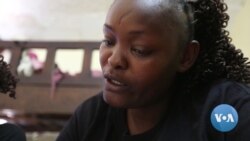The World Health Organization says East Africa has the highest rate of cervical cancer in the world. In October, Kenya launched a mass vaccination of girls against the human papillomavirus (HPV), which can lead to cervical cancer. The vaccine is being welcomed by HPV patients, who hope their children will be protected better than they were.
Thirty-year-old Jacinta Agunja tested positive in 2016 for one of the human papillomaviruses (HPV) that leads to cervical cancer.
After two years of intensive and expensive treatment, she was free of HPV and did not get cancer.
Agunja hopes Kenya’s mass vaccination of girls, launched in October, will prevent her 10-year-old daughter from also getting the virus.
"That vaccine, I need it to help my daughter and other women who are not sexually active now," said Agunja. "When they become sexually active, they will be already protected so that they cannot go through what I went through, because women in informal settlement(s) cannot afford that much."
Kenya is offering the free HPV vaccine as part of the county’s routine immunization schedule to 10-year-old girls.
WATCH: Kenya Hopes HPV Vaccinations Reduce Cervical Cancer Rate
Doctors say the vaccine program is a major milestone in the fight against cervical cancer in East Africa, which has the highest rate in the world.
Dr. Catherine Nyongesa is the director of the Texas Cancer Center, a private hospital started in 2010 to offer specialized cancer treatment.
"Parents are encouraged to take their children for vaccination but, all the same, vaccination does not give one the guarantee that you will not get the cancer," said Nyongesa. "But studies in developed countries have shown that actually the rate of cervical cancer goes down with planned, proper immunization."
At least seven women die every day in Kenya from cervical cancer, according to the Ministry of Health.
The ministry says the HPV vaccine could cut the rate of cervical cancer by up to 70 percent.
Cicily Kariuki is Kenya's Cabinet secretary for health.
"We have managed to distribute the vaccine to 47 counties, in all of the public facilities," said Kariuki. "We have covered an upward of up to 300,000 girls to date. The target continues because our target is 800,000 girls."
At least 115 countries have made the HPV vaccine routine, including some in East Africa.
Rwanda first introduced the vaccine in 2006, followed by Uganda in 2015 and Tanzania in 2018.
While Kenya normally leads development in the region, its efforts in preventing cervical cancer are seen by many – including Agunja - as better late than never.








